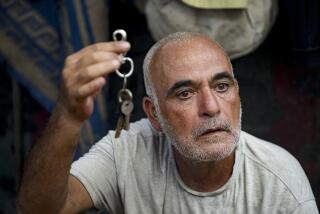One Family Escapes After Desert Ordeal : Kuwait: A battered Chevrolet carries an oil worker and 11 others on a dangerous drive across the Saudi border.
- Share via
ABU DHABI, United Arab Emirates — One family’s escape from Kuwait, an ordeal involving Iraqi guns and a dangerous drive over a desert track, has come to a close in Abu Dhabi.
“We’re fine now, we’ve had a rest, we’re among friends,” the family’s head, a 38-year-old Kuwaiti oil worker, said Friday at an Abu Dhabi hotel. He asked not to be identified by name but gave this account of events:
He arrived Thursday night in his bashed and looted car, a Chevrolet Caprice. It had carried 12 people to safety--the Kuwait Oil Co. field operator; his wife; seven children from ages 1 month to 14 years; his 85-year-old father-in-law, and two Sri Lankan maids.
The 12 were jammed one on top of another, with the threat of a desert breakdown constantly with them.
The oil worker said their escape started last Sunday, three days after the Iraqi invasion of his country, and after he became convinced that he had to get his family out.
“We knew the danger,” he said over coffee in the hotel snack shop. “We had to think of the security of our kids.”
The danger was made clear on Aug. 2, the first day of the invasion. The oil worker was at work, on the night shift, when the “clashes and bombing” began. He returned to his home in a southern suburb of the Kuwaiti capital, where no fighting had taken place, and decided that everything was secure enough to report for duty the next night.
“I made a mistake,” he said.
An Iraqi patrol stopped a car carrying him and some co-workers, ordered them out and held them for eight hours, demanding information about Kuwaiti troops and the layout of the city.
“They made us sit on the road and kicked us around,” he said. “We thought they were going to kill us, but they finally turned us loose.”
The oil-field operator made his way home, talked things over with his father and brothers and decided to head for the border with Saudi Arabia.
The Chevrolet had been trashed by marauding Iraqis, the radio and stereo ripped out, the windshield broken and the trunk jimmied open. But it could be driven, so the oil worker and his family joined a three-car caravan down the main coastal road.
They passed two Iraqi checkpoints and what the worker said were heavy concentrations of Iraqi armor and finally reached the border and the final Iraqi checkpoint.
“They saw our passports, leveled their assault rifles and turned us away,” the Kuwaiti said.
He did not argue, he said, because minutes earlier he had seen an Iraqi soldier shoot down a Kuwaiti. He surmised that the victim had been identified as a member of Kuwait’s military.
“We drove about 3 kilometers back up the road and saw a desert road turning inland,” he said, and although no one in the group had ever driven this track, “the surface seemed OK.” It led toward the frontier.
“We were alone,” he went on, “but a few kilometers along we came up on about 50 cars, moving slowly. We fell in line.”
They carried water but no food and could only hope that the drivers ahead of them knew the way. Abandoned cars marked the passage, apparently out of fuel or overheated.
When vehicles broke down, “guys with jeeps gave them a tow,” he said. “We stayed together to help each other.”
After three hours, with no sign of more Iraqis, who were apparently clustered on the coastal road, the refugee caravan reached the frontier and was waved through by Saudi soldiers.
At Khafji, the nearest Saudi town, the caravan was met by a Sudanese banker, who offered the sanctuary of a vacationing friend’s flat. Two days later, the oil worker and his family pushed on to Abu Dhabi. The family is now ensconced in three rooms offered at half price by a chain hotel.
A U.S.-trained physician, who was en route back to Kuwait when the crisis broke, joined in the conversation, asking the oil worker for the latest news from the Kuwaiti capital. With telephone communications out, refugees fleeing Kuwait are an important source of news.
The oil worker told of disorder among ill-disciplined young Iraqi troops.
“In a group, they abuse you, kick and punch you.” he said, “But alone, some say they don’t want to be in Kuwait and they’re sorry for the invasion.
“All of them are looting. I was told they are trading their guns for cars. That’s how the resistance is getting arms. I don’t know that it’s true, but I believe it.
“One soldier--they’re just kids, none over 20--told me, ‘I was promised by an officer that I would go back to Baghdad in a car. I would drive it myself.’ ”
The Kuwaiti said he left a second car at home and added: “I don’t expect to see it again. But I will return to Kuwait. I just don’t know how or when.”
More to Read
Sign up for Essential California
The most important California stories and recommendations in your inbox every morning.
You may occasionally receive promotional content from the Los Angeles Times.










